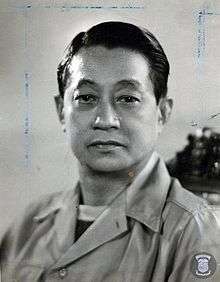José Zulueta
José Zulueta (November 23, 1889 – December 6, 1972) was a Philippine lawyer and politician. He served as Senate President for a brief period in 1953.
José Zulueta | |
|---|---|
 | |
| 9th President of the Senate of the Philippines | |
| In office May 20, 1953 – December 30, 1953 | |
| President | Elpidio Quirino |
| Preceded by | Camilo Osías |
| Succeeded by | Eulogio Rodriguez |
| Senator of the Philippines | |
| In office December 30, 1951 – December 30, 1957 | |
| 7th Speaker of the Philippine House of Representatives | |
| In office June 9, 1945 – December 20, 1945 | |
| President | Sergio Osmeña |
| Preceded by | Benigno Aquino, Sr.[1] |
| Succeeded by | Eugenio Pérez |
| Member of the Philippine House of Representatives from Iloilo's First District | |
| In office 1928–1946 | |
| Preceded by | Eugenio Baldana |
| Succeeded by | Mateo M. Nonato |
| In office December 30, 1949 – December 30, 1953 | |
| Preceded by | Mateo M. Nonato |
| Succeeded by | Pedro G. Trono |
| In office December 30, 1969 – September 23, 1972 | |
| Preceded by | Pedro G. Trono |
| Succeeded by | Vacant[2] Post later held by Oscar G. Garin |
| Secretary of the Interior | |
| In office 1946–1948 | |
| President | Manuel Roxas |
| Preceded by | Rafael Alunan |
| Succeeded by | Sotero Baluyut |
| Personal details | |
| Born | José Zulueta November 23, 1889 Molo, Iloilo, Captaincy General of the Philippines, Spanish Empire |
| Died | December 6, 1972 (aged 83) Paco, Manila, Philippines |
| Nationality | Filipino |
| Political party | Liberal |
| Spouse(s) | Soledad Ramos |
Career
During the Japanese occupation, Zulueta was accused of collaboration, along with Jorge Vargas, Jorge Bocobo and Manuel Roxas, being the first to respond to General Homma's order to form an Executive Commission. After the establishment of the Philippine Republic in 1946, the Department of Interior was restored and Zulueta was appointed by President Manuel Roxas once again to head the agency until 1948. Zulueta's term was marked by heightened tensions with the Hukbalahap movement, with Zulueta instituting a pass system that was required of Central Luzon residents wishing to travel outside their towns. Like his mentor Roxas, he adopted a hardline attitude toward the Huks, declaring in 1947 that the Huks faced only two choices: surrender or annihilation. He gave carte blanche to the Philippine Constabulary in all their operations against "dissidents". He was in charge of negotiating several times with its leaders, including Luis Lava, Luis Taruc, Juan Feleo and Jose de Leon.
In 1946, Zulueta was elected as Speaker of the House of Representatives in the inaugural session of the Congress.
He became Senator (1951–1957) and was briefly elected the Senate President in 1953. He became Provincial Governor of Iloilo in 1959.
During the Marcos administration, he was made the Presidential Consultant on Local Government.
He is among the few Filipinos included in the World Biography, 1948 edition and in the International Who's Who, 1952 edition.
Zulueta was married to Soledad B. Ramos.
Library work
After his stint in journalism, Zulueta returned to academic work and focused on librarian tasks. He travelled the world and met famous collectors including Wenceslao Retana. He collaborated with bibliographers and historians such as James Alexander Robertson and Emma Helen Blair who needed references for work such as The Philippine Islands, 1493 to 1898. He also visited Spain to study the 1887 Exposicion General de Filipinas, and Cambridge to study the Vocabulario Tagalo. In Manila, he created archives and texts to collate the various historical sources for creating the Philippines' history, using both local and foreign sources.
References
- Aquino served as Speaker of the National Assembly during the Japanese Occupation (1942-1945)
- When Martial Law was declared, the Congress was dissolved.
- List of Iloilo 1st District Representatives
- Philippine Senate bio of Jose C. Zulueta, the first parts of which have been erroneously conflated with the life of the bibliographer Clemente Jose Zulueta (1876-1904), December 24, 2009)
- Department of Interior and Local Government History, accessed December 24, 2009
- William Pomery, The Philippines, pp, 117 and 153 (Accessed on December 24, 2009)
- Benedict Kerkvliet, The Huk Rebellion, p. 189, 190 (Accessed on December 24, 2009)
